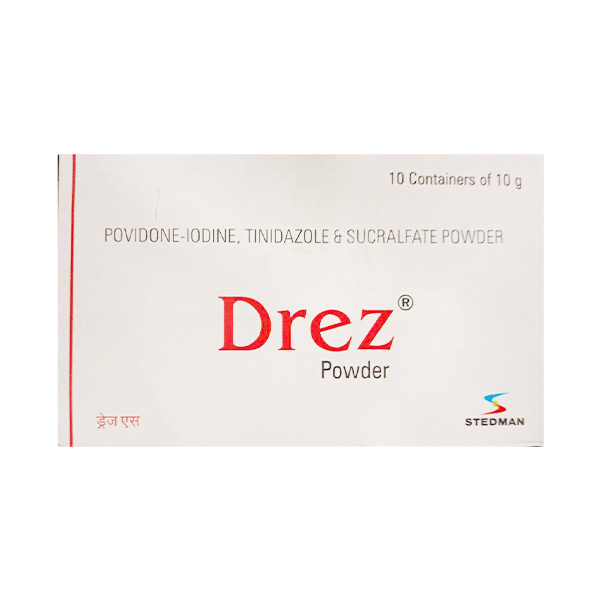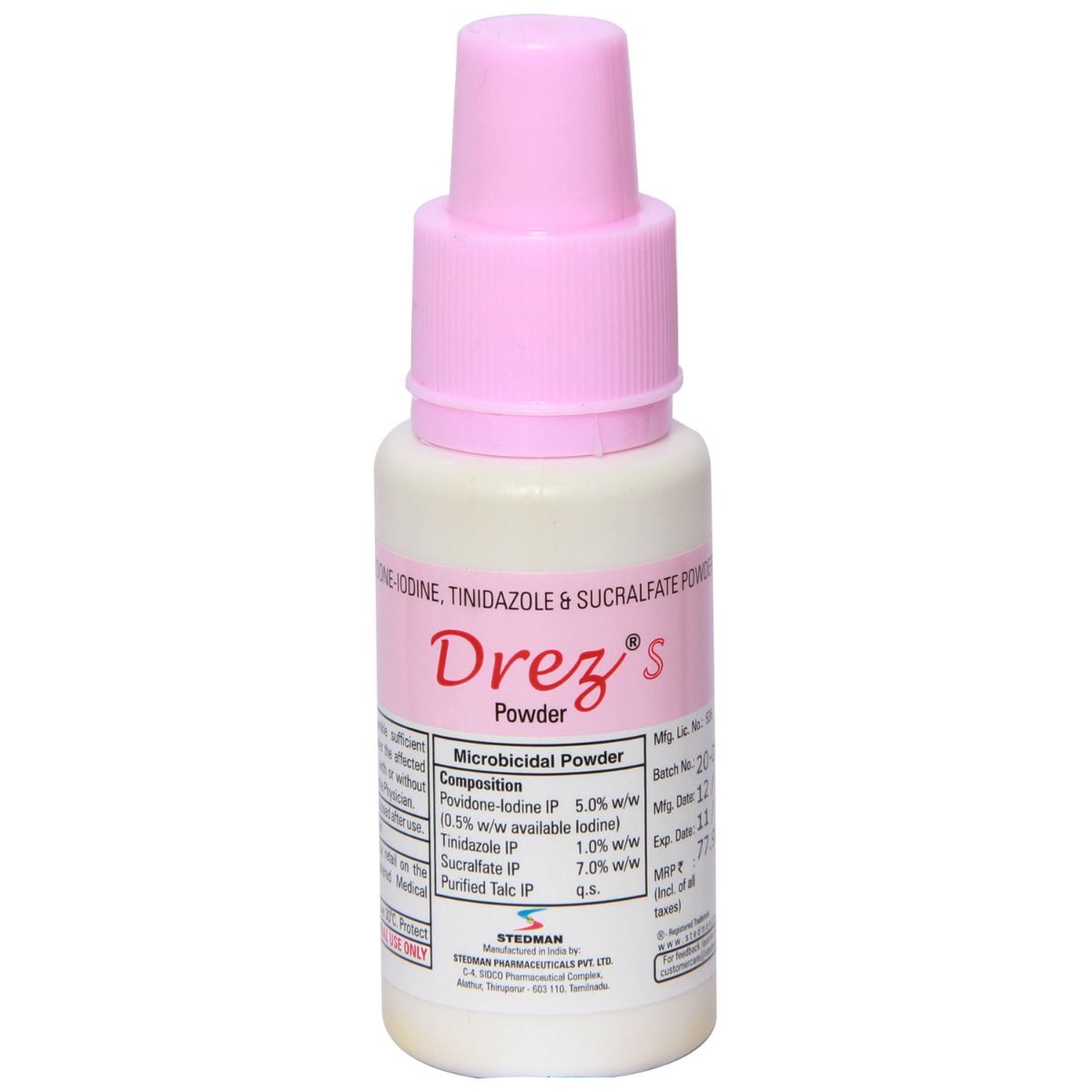Abdine Ointment
₹64.8*
MRP ₹72
10% off
₹61.2*
MRP ₹72
15% CB
₹10.8 cashback(15%)
Free Delivery
With Circle membership
(Inclusive of all Taxes)
This offer price is valid on orders above ₹800. Apply coupon PHARMA10/PHARMA18 (excluding restricted items)
Know Your Delivery Time
Provide Delivery Location


Secure Payment

India's Most Trusted Pharmacy

Genuine Products
About Abdine Ointment
Abdine Ointment belongs to the class of antiseptic and antibiotic drugs, primarily used to treat minor wounds and infections. It effectively treats lacerations (deep cut in the skin), abrasions (the first layer of skin is scraped off), diabetic foot ulcers, bedsores, impetigo (red sores on the face), boils or carbuncles and radiation/chemotherapy ulcers. Abdine Ointment is also used in infection control during post-surgical dressing, post-cosmetic and plastic surgery and post-episiotomy (surgical cut during childbirth) dressing.
Abdine Ointment consists of three medicines, namely: Povidone Iodine, Tinidazole, and Sucralfate. Povidone Iodine is an ‘antiseptic’ that is used for skin disinfection before and after surgery. It works by inhibiting the growth of infection-causing microbes. Tinidazole belongs to the ‘antibiotic’ class of drugs. It is an antiprotozoal and antibacterial agent that treats bacterial and parasitic infections. It works by damaging the DNA and stopping the growth of bacteria and parasites. Sucralfate belongs to the class of ‘protectants.’ It is used to treat various wounds, ulcers and inflammation. It works by forming a protective layer over the surface of ulcer and promotes the healing.
Abdine Ointment is for external use only. Abdine Ointment has common side effects as every medicine does. These include dry skin, itchiness, burning, redness and irritation at the application site. These side effects gradually resolve during the treatment and do not require medical attention.
Brief your medical history to the doctor, if you are allergic to Abdine Ointment or any other medicines. Let your doctor know if you have an overactive thyroid gland (hyperthyroidism) or thyroid diseases, fits, liver and kidney problems. Please tell your doctor if you are undergoing any lithium therapy or treatment involving radioactive iodine. Also, consult your doctor if you are pregnant or breastfeeding before using Abdine Ointment.
Uses of Abdine Ointment
Directions for Use
Medicinal Benefits
Abdine Ointment is a dermatological combination used to treat and prevent skin infections in lacerations, abrasions, diabetic foot ulcers, bedsores, impetigo, boils or carbuncles, and radiation/chemotherapy ulcers. It consists of three medicines, namely: Povidone Iodine, Tinidazole, and Sucralfate. Povidone Iodine is an ‘antiseptic’ that is used for skin disinfection before and after surgery. It works by inhibiting the growth of infection-causing microbes. Tinidazole belongs to the ‘antibiotic’ class of drugs. It is an antiprotozoal and antibacterial agent that treats bacterial and parasitic infections. It works by damaging the DNA and stopping the growth of bacteria and parasites. Sucralfate belongs to the class of ‘protectants.’ It is used to treat various wounds, ulcers, and inflammation. It works by forming a protective layer over the surface of the ulcer and promotes healing.
Side Effects of Abdine Ointment
- Dry skin
- Itchiness
- Burning
- Redness
- Irritation
Storage
Drug Warnings
Abdine Ointment is for external use only. Do not swallow the medicine. Let your doctor know if have allergic reactions to medicines, an overactive thyroid gland (hyperthyroidism) or any other thyroid diseases, liver or kidney problems, fits, weak immune system and anaemia before starting Abdine Ointment. Inform your doctor if you are undergoing any lithium therapy or treatment involving radioactive iodine. Please consult your doctor if you are pregnant or planning to conceive or a breastfeeding mother before using Abdine Ointment. Store Abdine Ointment at temperatures not exceeding 30°C.
Therapeutic Class
Drug-Drug Interactions Checker List
- HYDROGEN PEROXIDE
- TANNIC ACID
- TAUROLIDINE
- MERCURY
- SILVER
Diet & Lifestyle Advise
- Use mild soap while taking baths and prefer warm baths.
- Avoid harsh products on your skin.
- Do not scratch or pick your skin to avoid getting the affected area infected.
- Manage stress, eat healthily, drink plenty of water, exercise regularly and get plenty of sleep.
- Do not walk barefoot at places like gym showers to prevent bacterial infections.
Habit Forming
How Abdine Ointment Works
What if I have taken an overdose of Abdine Ointment
Alcohol
Safe
No interaction found/established.
Pregnancy
Caution
Using Abdine Ointment during pregnancy may affect the unborn baby. Please consult your doctor before using Abdine Ointment if you are pregnant or planning to conceive. Your doctor will weigh the benefits and potential risks before recommending to you.
Breast Feeding
Caution
There is limited data on Abdine Ointment affects breastfeeding. Please consult your doctor before using Abdine Ointment if you are nursing. Your doctor will weigh the benefits and any potential risks before recommending it to you.
Driving
Safe
Abdine Ointment is generally safe to use before driving. However, if you notice any side effects like dizziness or burning sensation at the affected areas, avoid driving and operating machinery until you feel better.
Liver
Caution
Let your doctor know if you have any history of liver diseases before using Abdine Ointment. Your doctor will weigh the benefits and any potential risks before recommending to you.
Kidney
Caution
Let your doctor know if you have any history of kidney diseases before using Abdine Ointment. Your doctor will weigh the benefits and any potential risks before recommending to you.
Children
Caution
Your doctor will advise Abdine Ointment depending on your child's severity of infection or wounds.
Country of origin
Author Details
We provide you with authentic, trustworthy and relevant information
FAQs
Disclaimer
Product Substitutes
Reference
- https://www.drugs.com/cdi/povidone-iodine-topical-products.html
- https://mundipharma.com.ph/multipage_uploads/2038/18857/BETADINE%20Ointment%20PIL%20PH-BET-0566-V3-1215%20(CPA).pdf
- https://pubmed.ncbi.nlm.nih.gov/19832693/
- https://www.drugs.com/mtm/tinidazole.htmlhttp://www.saffermion.com/dresin-oint.asp



















